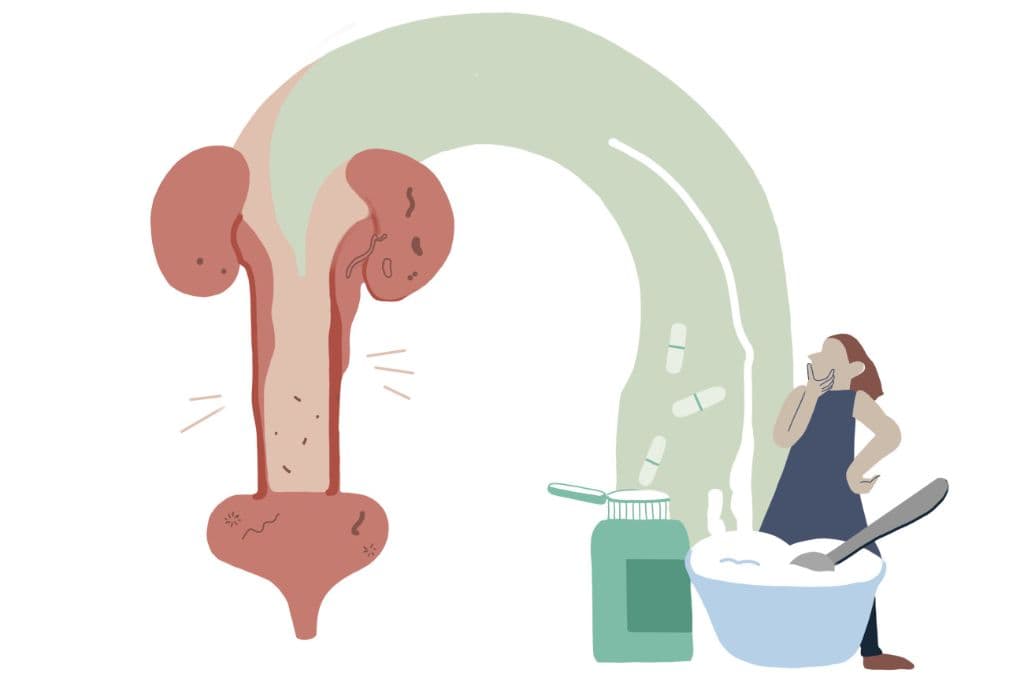Urinary infections occur when bacteria that are normal present in our fecal tract. for some reason, come in contact with the urinary opening or urethra, travel upwards and infect an otherwise sterile urinary tract. Antibiotics have been the mainstay of treatment for UTIs all these years and the rising antibiotic resistance has posed to be a major problem for care providers. Enter products such as probiotics and UTI vaccines in international and Indian markets. We would like to discuss if they are appealing and feasible alternatives for folks with a recurrent infection.
In recent times, the popularity of probiotic products has increased manifold. Consumers can find it in fruit juices, cereals, cookies, sausages, granola bars and pet food. Probiotic products have the capacity to treat everything from obesity to depression.
What are urinary probiotics?
The term probiotic is composed of two words: “pro” in Latin and “bios” in Greek meaning life. Probiotics as a concept was first introduced by Elie Metchnikoff, the Russian Nobel Prize winner in 1907. The World Health Organization (WHO) has defined probiotics as “useful living microorganisms that have a positive effect on the health and physiology of a person when taken in sufficient quantities. A probiotic is a live microorganism that confers a health benefit.
Clinical evidence suggests that probiotics helps to prevent UTIs by keeping ‘bad’ bacteria from growing in your pubic region. Probiotics are available in supplements and in fermented foods such as plain Greek yogurt, cheese.
Probiotics have been found to be extremely beneficial in the treatment of recurrent UTIs. In their study, Zucotti et al. stated that probiotics could be a good alternative to antibiotic therapy because of their ability to bind to cells in your bladder wall and inhibit growth of harmful bacteria.
The idea of getting patients to have probiotics is based on the knowledge that pathogens/ bacteria that cause most of the urogenital infections progress from the rectum to the perineal(groin) region and then to the vagina and the urinary opening.
How do they act? How effective are they and how does one take them?
Probiotics can be found in foods and food supplements (in capsule, tablet and powder forms). The bacteria may be present from the beginning in probiotic foods and supportive treatment agents, or may be added during the preparation of the product. Probiotics must be resistant to gastric and bile acids in order to reach the intestinal system and produce beneficial effects on the body.
The main work of probiotics, or good bacteria, is to maintain a healthy balance in your body. It helps to keep your body in neutral state. When you are sick, bad bacteria enters your body and increases in number. This knocks your body out of balance. Good bacteria work to fight off the bad bacteria and restore the balance within your body, making you feel better. Good bacteria keep you healthy by supporting your immune function and controlling inflammation. Certain types of probiotics can also help the body digest food, keep bad bacteria from getting out of control and making you sick.
When considered as a part of multiple treatment, antibiotics and probiotic treatment should both be addressed to prevent damage to viable microorganisms in the gastrointestinal tract.
UTI Vaccines
UTIs account for a significant proportion of infections that need antibiotic treatment, and it is essential to explore alternative therapies to it and vaccination offers an alternative. UTI vaccines can substantially reduce recurrent urinary tract infections (UTIs) and should be considered as an alternative to antibiotics. UTI vaccines are nothing but killed or inactivated cultures of bacteria that most commonly cause a UTI. Just like conventional vaccines you may have seen before, these act by exposing your body to quantities of the bacteria sufficient to fight off an infection.
Products such as Uromune® , Uro-Vaxom or Urovac (Switzerland) ,contain an inactivated bacterial cell suspension of selected strains of Escherichia coli, Klebsiella pneumoniae, Proteus vulgaris, and Enterococcus faecalis. It is a sublingual bacterial vaccine in order to prevent recurrent UTIs (more than three episodes a year).
Probiotics can be regarded as the single most powerful alternative option under clinical development for the prevention and treatment of chronic infection. Given the enormous burden on patients, as well as the scientific and economic problem caused by UTI, the investigation of probiotics is of crucial importance for patient benefit. To know more about UTIs, please visit www.proactiveforher.com
Disclaimer: This article is for informational purposes only and should not be construed as a substitute for medical advice or treatment.

